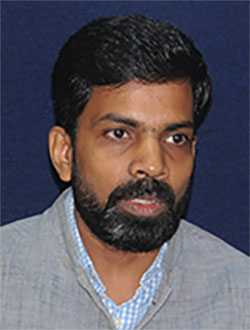You are here

Dr Rajeesh Kumar is a Research Fellow at the Institute. Dr Kumar completed his PhD from the Centre for International Politics, Organization and Disarmament, Jawaharlal Nehru University, New Delhi. Prior to joining MP-IDSA in 2016, he held teaching positions at Jamia Millia Islamia, New Delhi and University of Calicut, Kerala. He is also the Book Review Editor of Strategic Analysis published by Routledge, the institute’s flagship journal.
Dr Kumar is the author of the monographs titled - Indian and Chinese Approaches to United Nations Peacekeeping in Africa (MP-IDSA, 2024), Principled but Evolving: India's Approach to Multilateral Peace and Security (MP-IDSA, 2021) and The International Committee of the Red Cross in Internal Armed Conflicts: Is Neutrality Possible (Palgrave Macmillan, 2019). He is also the co-editor of India and Africa: Deepening the Security Engagement (Pentagon, 2024), Eurozone Crisis and the Future of Europe: Political Economy of Further Integration and Governance (Palgrave Macmillan, 2014) and Islam Islamist Movements and Democracy in the Middle East (Global Vision, 2013). His articles, opinion pieces, and reviews have appeared in Journals and Newspapers, including Strategic Analysis, India Quarterly, Journal of Defence Studies, Journal of Common Market Studies, Central European University Political Science Journal, The Indian Journal of Politics and International Relations, E-International Relations, The Hindu, The Diplomat, Japan Times, Tehran Times and The Outlook.
He was also one of the Co-Chairs of the Think-20 Task Force on ‘Reformed Multilateralism: Transforming Global Institutions and Frameworks’ during India’s G20 presidency.

The G7's African Agenda: Promises Unmet
During the 50th G7 summit in Italy, Africa took centre stage in the development discussions, with the G7 committing to align its initiatives with the African Union's Agenda 2063. Noteworthy efforts included the 'Energy for Growth in Africa' project, which focuses on advancing clean energy and providing technical assistance. However, doubts remain due to the G7's history of unmet commitments. Despite numerous promises concerning infrastructure, debt relief, and health security, the G7's aid to Africa has often been insufficient.
Africa and the United Nations Summit of the Future
The upcoming United Nations Summit of the Future presents a critical opportunity for Africa to advocate for more inclusive and equitable global governance.
India and Africa: Deepening the Security Engagement
Indian and Chinese Approaches to United Nations Peacekeeping in Africa
This monograph delves into Indian and Chinese approaches to UN peacekeeping in Africa, offering insights into how these rising powers interact with African nations. It analyzes their motivations and guiding principles in peacekeeping on the continent, comparing their approaches and highlighting differences in scope and impact.
Can the Security Council Help Bring Peace to Gaza?
Resolution 2728, adopted by the United Nations Security Council on 25 March 2024 carries political implications beyond its text, particularly due to the US decision to abstain.
MONUSCO's Early Withdrawal and the Future of UN Peacekeeping in Africa
The UN should shift towards more traditional and narrowly focused peacekeeping missions and maintain a clearer and more distinct role as a neutral mediator in conflicts.
BRICS: 15th Summit and Beyond
The 15th BRICS Summit showcased the organisation’s resilience, adaptability and collective vision, and positioned the group as a potent global player.
Multilateralism Matters: Adoption of the Treaty of the High Seas and its Significance
The adoption of the Treaty of the High Seas by the United Nations represents a significant triumph for multilateralism.
International Law Matters: Implications of the ICJ Reparations Judgment in the DRC v. Uganda Case
The ruling is considered the most detailed decision of the United Nations' top court in war compensation and signifies the occupying powers' reparation duties for damages resulting from its direct and indirect actions that violate international law. The judgement is undoubtedly historic and destined to act as a precedent for future cases. It once again establishes the fact that international law matters in situations of interstate armed conflicts.
Explained | Multilateral reforms as a priority in the G-20
Associate Fellow, Manohar Parrikar IDSA, Dr Rajeesh Kumar’s article ‘Explained | Multilateral reforms as a priority in the G-20’ has been published in ‘The Hindu’ on 06 March 2023.
The article analyses should multilateralism be given importance in today’s global order? How can the G-20 help in multilateral reform? Can multiple minilateral groupings become an alternative mode of multilateral cooperation? Why would global powers be averse to the idea of reform in multilateral institutions?